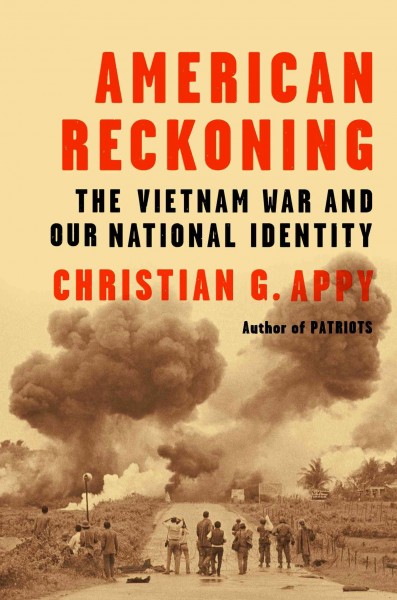 I grew up in the post-Vietnam War generation. I always had a feeling, as a child, that I wasn’t supposed to ask questions about the war. Prior to college my only knowledge of the war was a) we lost and b) it was bad. When I took classes on the war in college, I was struck by the incongruities of the stereotypical war protester (hippy) and my dad, who opposed the war but was as “square” as they come. Appy’s American Reckoning is an effort to challenge those stereotypes by complicating our understanding of the Vietnam War and explore how it has effected our national consciousness.
I grew up in the post-Vietnam War generation. I always had a feeling, as a child, that I wasn’t supposed to ask questions about the war. Prior to college my only knowledge of the war was a) we lost and b) it was bad. When I took classes on the war in college, I was struck by the incongruities of the stereotypical war protester (hippy) and my dad, who opposed the war but was as “square” as they come. Appy’s American Reckoning is an effort to challenge those stereotypes by complicating our understanding of the Vietnam War and explore how it has effected our national consciousness.
The book opens by examining how an independence struggle by the Vietnamese against their French overlords became one of America’s longest and costliest wars. Appy suggests it was more than a simple case of myopic American anti-communism foreign policy dragging us into a quagmire. He links it to a fear of looking weak in the face of communism by multiple presidential administrations. Both Kennedy and Johnson were very sensitive to the fact the Republicans had hammered Truman for “losing China to communism” in the 1940s. Neither was willing to risk the same hammering by pulling out of Vietnam even though they did have some doubts about winning. This lead to multiple escalations over the course of the 1960s.
The second part of the book looks at the evolving opposition to the war. Appy highlights a few modern misconceptions we have about the anti-war movement. First of all, opposition didn’t really become overwhelming until the 1970s at which point some 60% of the population were against the war. There was always a sizable portion of the population that supported the war or at least the troops. Secondly, the anti-war movement itself was a cross section of American society. It included everyone from left wing radicals bent on overthrowing the government to working class house wives. It wasn’t until after the war that the image of the anti-war movement became so closely linked with the counter culture movement. This was the major thing I got out of this books since it explains why my father could be simultaneously straight laced and part of the anti-war movement.
Finally, the book explores political and social events following the war and how they were ultimately impacted by Vietnam. Appy tries to link American’s society’s complex relationship with the war in Vietnam to all the foreign policy issues of the 80s and 90s. The majority of the public remained in opposition to any foreign involvement throughout the 80s and 90s in spite of multiple military interventions. Politicians tried to either hide their foreign intervention from the public or argue that their foreign intervention exercised the ghost of Vietnam. Reagan’s anti-communist wars in Central and South America were kept mostly below the radar of the American public. George H. W. Bush’s Gulf War was presented as the cure for Vietnam War Syndrome. I think this is the point of the book where Appy skates onto thin ice. Arguing that Vietnam shaped American consciousnesses for decades to come is hardly earth shattering news. That’s the case after every war America has fought in. He also hints at other factors that also contributed to post-Vietnam society but tends to gloss over them: class, race and the economy.
The overall tone of this book is very grim. Most books on the Vietnam war tend to look for some bright spot, even if it’s just the personalities of the participants, but Appy refuses to do that. Even when talking about things that he sees as by-in-large positive, there is a tinge of disapproval in his writing. When discussing the anti-war movements in the 1980s that opposed Reagan’s interventions in Central and South America and their efforts to oppose wars that went largely noticed by the American public, he acknowledges how important they are, but simultaneously argues that they were dim shadows of the the anti-war movement of the 1970s.
American Reckoning adds a great deal to the study of the Vietnam War with its examination of the relationship of American consciousnesses to the war. Lovers of political, cultural and even pop-culture history will get some very interesting insights from this book. At the same time it is a very stark view of the war and anyone looking for a bright side to it all won’t find it here.
